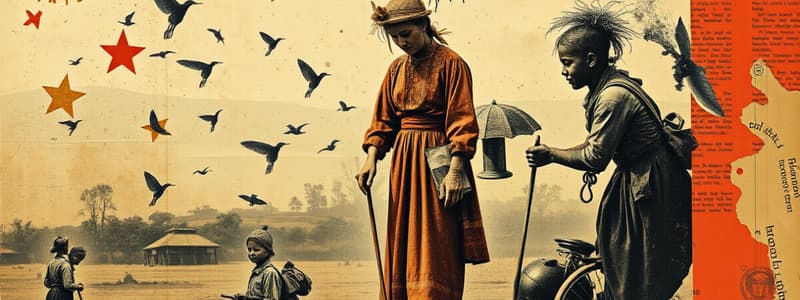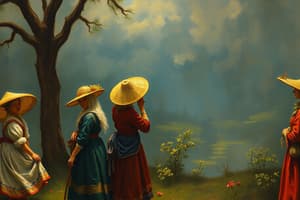Podcast
Questions and Answers
The concept of folk culture does not include elements such as traditional dances and music.
The concept of folk culture does not include elements such as traditional dances and music.
False (B)
Folk culture is typically stable through time but varies significantly across different geographic locations.
Folk culture is typically stable through time but varies significantly across different geographic locations.
True (A)
Folk customs are believed to originate only in the recent past and change rapidly.
Folk customs are believed to originate only in the recent past and change rapidly.
False (B)
Folk cultures predominantly use modern communication technologies to transmit knowledge.
Folk cultures predominantly use modern communication technologies to transmit knowledge.
The term folk derives from languages that referred to groups like armies, clans, or communities.
The term folk derives from languages that referred to groups like armies, clans, or communities.
Folk cultures rely heavily on experimenting with new forms of housing once a functional house type is developed.
Folk cultures rely heavily on experimenting with new forms of housing once a functional house type is developed.
Food production within folk cultures typically relies on a limited variety of crops for sustenance.
Food production within folk cultures typically relies on a limited variety of crops for sustenance.
Folk cultures may change their beliefs and customs rapidly due to external influences.
Folk cultures may change their beliefs and customs rapidly due to external influences.
Clothing in folk culture is primarily made from materials such as imported silk and synthetic fibers.
Clothing in folk culture is primarily made from materials such as imported silk and synthetic fibers.
Public schooling can serve as a vehicle for promoting national values.
Public schooling can serve as a vehicle for promoting national values.
The Slow-food movement arose to promote fast food consumption as a cultural experience.
The Slow-food movement arose to promote fast food consumption as a cultural experience.
According to Ferdinand Tönnies, gemeinschaft refers to social relations in a larger society.
According to Ferdinand Tönnies, gemeinschaft refers to social relations in a larger society.
Intoxicants have been used by folk cultures historically for entertainment and altering mental states.
Intoxicants have been used by folk cultures historically for entertainment and altering mental states.
The diffusion of popular culture is hindered by the growth of the internet.
The diffusion of popular culture is hindered by the growth of the internet.
Folk tales serve as foundational myths, origin stories, and cautionary tales in many cultures.
Folk tales serve as foundational myths, origin stories, and cautionary tales in many cultures.
The shrinking of rural communities has no impact on the preservation of folk culture.
The shrinking of rural communities has no impact on the preservation of folk culture.
Popular culture is primarily driven by factors such as tradition and local craftsmanship.
Popular culture is primarily driven by factors such as tradition and local craftsmanship.
Holidays in popular culture serve primarily as opportunities for selling merchandise.
Holidays in popular culture serve primarily as opportunities for selling merchandise.
Folk cultures have historically avoided interactions with popular culture to maintain their traditions.
Folk cultures have historically avoided interactions with popular culture to maintain their traditions.
The rise of global communication has made it easier to spread elements of folk culture.
The rise of global communication has made it easier to spread elements of folk culture.
Increasing access to infrastructure has facilitated the spread of both folk and popular cultures.
Increasing access to infrastructure has facilitated the spread of both folk and popular cultures.
Immigrants to the United States today mostly come from areas of folk culture.
Immigrants to the United States today mostly come from areas of folk culture.
Fashion in popular culture is a driving force behind continual reinvention and marketing of products.
Fashion in popular culture is a driving force behind continual reinvention and marketing of products.
William Gibson stated that the future is unevenly distributed.
William Gibson stated that the future is unevenly distributed.
Globalization predominantly benefits folk culture by increasing its visibility and value.
Globalization predominantly benefits folk culture by increasing its visibility and value.
The slow food movement emphasizes locally sourced food products as a form of resistance to globalization.
The slow food movement emphasizes locally sourced food products as a form of resistance to globalization.
Both leftists and rightists oppose globalization, but for fundamentally different reasons.
Both leftists and rightists oppose globalization, but for fundamentally different reasons.
Economic realities have no significant impact on folk culture practices.
Economic realities have no significant impact on folk culture practices.
Anti-globalist movements often idealize a past era as the model for a desirable society.
Anti-globalist movements often idealize a past era as the model for a desirable society.
Popular culture is perceived as purely traditional and rural in nature.
Popular culture is perceived as purely traditional and rural in nature.
The rise of global culture has occurred relatively recently in human history.
The rise of global culture has occurred relatively recently in human history.
Folk cultures have proven to be less resilient than popular cultures.
Folk cultures have proven to be less resilient than popular cultures.
Movements like Al-Qaeda and Islamic State embrace popular culture and its global expansion.
Movements like Al-Qaeda and Islamic State embrace popular culture and its global expansion.
Cultural lag refers to the gap in time it takes for a new idea or product to be adopted in populous locations.
Cultural lag refers to the gap in time it takes for a new idea or product to be adopted in populous locations.
The commercialization of Christmas has been primarily documented in non-Western countries for over a century.
The commercialization of Christmas has been primarily documented in non-Western countries for over a century.
The process of commodification involves changing a cultural attribute into a mass-market product.
The process of commodification involves changing a cultural attribute into a mass-market product.
Folk intoxicants such as tobacco and coca were originally used for recreational purposes before becoming commercialized.
Folk intoxicants such as tobacco and coca were originally used for recreational purposes before becoming commercialized.
The internet has no significant impact on the advertisement of popular culture products.
The internet has no significant impact on the advertisement of popular culture products.
Globalization leads to the frictionless movement of ideas, money, and people.
Globalization leads to the frictionless movement of ideas, money, and people.
Hierarchy in popular culture diffusion means smaller places tend to generate many of pop culture’s hit songs and styles first.
Hierarchy in popular culture diffusion means smaller places tend to generate many of pop culture’s hit songs and styles first.
The global market for popular culture products is influenced by the same level of local authenticity as it was historically.
The global market for popular culture products is influenced by the same level of local authenticity as it was historically.
Taco Bell is known for selling authentic Mexican food within Mexico.
Taco Bell is known for selling authentic Mexican food within Mexico.
The term 'global culture' refers to a popular culture that is limited to specific national boundaries.
The term 'global culture' refers to a popular culture that is limited to specific national boundaries.
Companies are willing to alter their products to appeal to local markets for cost-effectiveness and return on investment.
Companies are willing to alter their products to appeal to local markets for cost-effectiveness and return on investment.
Mass media products today are rarely associated with other popular culture entities.
Mass media products today are rarely associated with other popular culture entities.
Marshall McLuhan’s statement 'The medium is the message' applies to all forms of popular culture.
Marshall McLuhan’s statement 'The medium is the message' applies to all forms of popular culture.
American entertainment products no longer consider their international box office sales as significant as domestic sales.
American entertainment products no longer consider their international box office sales as significant as domestic sales.
Local customs and rituals have completely disappeared from modern popular culture due to commercialization.
Local customs and rituals have completely disappeared from modern popular culture due to commercialization.
Flashcards are hidden until you start studying
Study Notes
Folk Culture
- Folk culture evokes traditional customs, dances, and music, often associated with the past and festivals.
- Origin of the term "folk" traces back to Old Norse, English, and Germanic roots, referring originally to armies, clans, or groups.
- Identifies distinct cultural practices shared among homogeneous groups, often tied to geographic landscapes.
- Folk customs remain stable over time but exhibit variability across different regions; they change slowly.
- Movement of folk culture occurs through relocation diffusion as groups migrate, bringing cultural items and ideas with them.
- Knowledge transmission happens through direct interaction or participation until mastery is achieved, such as cooking or building.
- Functional adaptations to local resources result in similar architectural styles and agricultural practices within culture areas.
- Folktales and folklore serve as foundational myths and cautionary narratives.
- Holidays like Mardi Gras disrupt daily life, providing cultural relief and opportunities to challenge societal norms.
- Folk cultures historically utilized psychoactive substances for rituals which have largely been commercialized in modern times.
- Revival of folk appreciation through cultural tourism and movements like Slow Food aims to reconnect with traditional practices.
- Famous efforts to record folk traditions include John Lomax's documentation of folk songs and narratives in early 20th-century America.
- The craftsmanship of folk production differs from factory work, emphasizing knowledge and relationship to materials versus industrial disconnection.
Changing Cultural Landscape
- Decline of folk culture confronts popular culture due to nationalistic state policies affecting minority lifestyles.
- Economic changes, such as rural community shrinkage since the Industrial Revolution, hinder the reproduction of folk customs.
- Infrastructure developments (roads, internet) facilitate the diffusion of popular culture while obstructing local practices.
- Cultural interchange in places like the U.S. results in transformation as immigrants bring popular cultural influences, complicating traditional folk identities.
Popular Culture
- Defined by commerce, popular culture revolves around marketing and consumption patterns.
- Individuals engage with ubiquitous products from global supply chains, leading to homogenized lifestyles disconnected from local resources.
- Constant evolution in popular culture emerges through fashion shifts driven by the need for companies to sell new items.
- Commercialization of holidays reflects a growing trend where cultural celebrations become opportunities for consumerism.
- Technologies like the internet significantly accelerate the diffusion of popular culture, resulting in cultural lag where innovations take varying times to reach different locales.
- Popular culture is stable across geographic spaces but exhibits rapid changes over time.
Global Culture
- Globalization integrates the world into a single economic framework, leading to emerging global cultural expressions.
- Differences in product authenticity are prominent; many international fast-food chains transform local cuisines into commodities.
- Cultural attributes are commodified for mass markets, often diverging from their original forms.
- Transnational corporations dominate popular culture production, with a few major entities controlling substantial shares of the market.
Resistance to Popular Culture
- Pushback against the corporatization and homogenization of cultural practices emerges from both leftist and rightist views on globalization.
- Opposition often centers on retaining state sovereignty against perceived cultural erasures of local identities.
- Resistance includes movements advocating for local food sourcing, traditional practices, and fair-trade products, such as the Slow Food movement.
Summary
- Culture encompasses a wide spectrum of human behaviors, historically revolving around small groups practicing folk traditions.
- Transition from folk culture to popular culture marks profound societal changes, facilitated by technological advances and globalization, culminating in the emergence of a global culture characterized by shared practices.
Studying That Suits You
Use AI to generate personalized quizzes and flashcards to suit your learning preferences.




